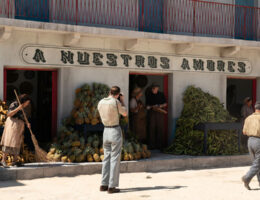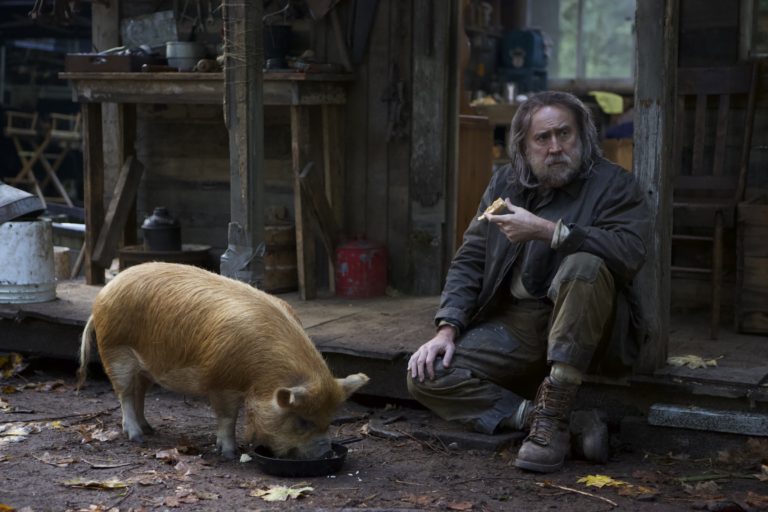Pig (2021 | USA | 92 minutes | Michael Sarnoski)
Nicolas Cage has pretty much always been a weirdo on screen, the degree to which it simmers or boils over varying based on the role and the director. But his last decade has found him in a full embrace of ever more aggressively oddball performances in films that capitalized on the kitsch factor of being a venue to see how far his envelope could be stretched. My personal tolerance for these exploits have often reached their limits. I sort of vibed to Mandy but bailed on this spring’s post-apocalyptic East-meets-Western Prisoners of the Ghostland at about the time a wild-eyed Cage was howling to the heavens after having one of his testicles exploded. At the time, I couldn’t imagine that there was anywhere more outlandish for him to go, but then I saw the trailer for Pig and felt embarrassed for forgetting the existence of Portland.
I thought I was out on ever-escalating rubbernecking, but I’m glad that I surrendered to my curiosity and approached it with the capacity for joy and surprise. Because with his feature film debut about one man’s love for his prized pig, writer-director Michael Sarnoski has harnessed Cage’s latent intensity and made what might be my favorite film I’ve seen so far this year.
Opening deep in the forests of Oregon we meet Rob, played by an extremely grizzled Nic Cage: sad-eyed, dressed for the wilderness, bearded, and years past his last haircut. Living in a ramshackle riverside cabin, his mornings involve picturesque hikes through wooded trails. He and his charming porcine companion silently and dutifully trek through shafts of dewy sunlight, sniffing out the region’s finest truffles. Afternoons involve the adoring pig watching as he lovingly crafts an enviably hyperlocal lunch pastry (the “Rustic Mushroom Tart” that gives the film’s first chapter its name) for them to share on the front porch. Occasional contacts from the cruel and commercial modern world come in the form of visits from truffle middleman, Amir (Alex Wolff), who rolls up in a his shiny yellow Camaro to pick up the goods, make very one-sided small talk, comment on Rob’s limited hygiene, and drop off occasional mementos from the city. When evening falls, the howls of distant coyotes fill the dark night.
Alas, nothing gold can stay and this tranquil off-the-grid existence comes to an upsetting end with a shockingly violent home invasion that parts man from beloved beast. When Rob recovers from the burglary, the pig is nowhere to be found. His quest to find her begins with a run through the woods in long-john onesies, takes him to a rural diner, puts him into confrontation with some “trailer tweakers”, and ultimately forces him to return to the city he abandoned years ago. Shot with gritty mystery and miraculous menace, Portland and its food scene is the setting for this remarkably transfixing odyssey with Wolff’s Amir as his wary chauffeur and guide.
As they revisit old acquaintances, we get hints about Rob’s life and stature before his arboreal exile. A city-renowned chef, his name still inspires some reverence and holds limited currency in some circles. Cashing in on these relationships to get clues, they follow leads from food truck parking lots to esteemed dining rooms, and into the city’s literal underbelly, an afterhours fight club for the restaurant industry. By the end of this terrible very bad day that makes up the film’s first chapter, you’ll see Nicolas Cage in a bare knuckle brawl with a tiny man in a shiny red suit in an abandoned cavern below Portland’s Pioneer Square. It’s all outlandish, obviously, but somehow grounded just enough that the enterprise’s feverish energy never tips over into parody.
The second chapter (“Mom’s French Toast and Deconstructed Scallops”) finds a beaten and bruised Cage nevertheless facing the harsh light of day. Cage and Wolff play this all straight and deadpan, the younger and shinier man regarding his elder’s bloodied face with a mix of horror and admiration. Amir raves about the reverence that people had for Rob’s restaurant; Rob counters with cooking tips (use stale bread for French Toast) and dispenses fatalistic monologues about the inevitability of an earthquake that will bury the city in debris and return it all to the sea. Inspiring stuff, really!
His weary trip around the city takes him to an old craftsman house where no one in the neighborhood nor the child inside gives a second glance to a deranged looking man wandering into a backyard. Similarly, when Amir cashes in a favor to get them a table at one of the city’s hottest restaurants, the staff are polite enough not to mention that their lunch guest is openly bleeding from the face. The Keep Portland Weird ethos is strong with this one, but it’s worth it to watch Cage excoriate one of his old trainees for abandoning a dream of a homey english pub in favor of pretentious locavore molecular gastronomy.
Despite many threats to abandon the pig and irrefusable offers to just buy a new one, Rob’s determination to recover his pig remains unflagging. (Though the charming pig is no Birba the Dog, theirs is a bond that will be familiar to anyone who’s seen The Truffle Hunters) As the film approaches its resolution and Philip Klein’s amazing and ethereal soundtrack takes a turn toward the mournful, Sarnoski delicately reveals the underlying tragedies that sent Rob into a life of woodland foraging and that caused Amir to be so receptive to an uneasy partnership with the outcast. The sources of each of their grief is the most typical thing about the film, but I suppose that something has to be relatable in a story that also posits a hidden world of power brokers orchestrating the pawns in the city’s competitive and thriving culinary scene.
Although the trailer hinted at some kind of John Wick Meets Portlandia, the ultimate confrontation with the quest’s Final Boss (a dark and seething Alan Arkin) turns tender rather than dialing up the violence. In the context of a story that’s delighted on the boundaries of absurdity, the tonal retreat is surprisingly poignant.
Throughout this truly heightened reality, Sarnoski maintains an astonishing mastery of control. Much of the pleasure of watching comes in the form of waiting, mouth agape, waiting for the whole house of cards to fall apart. But the script never blinks and Cage’s ability to navigate this tightrope act of heartbreak, rage, and nihilism is deeply admirable. Wolff holds his own as incredulous audience surrogate, finding humor and sadness in the proceedings. Those willing to submit to this wild ride will find themselves in capable hands. Like the best fine dining experience, this story of reckoning, loss, and devotion is both ridiculous and sublime.
Pig arrives in theaters on July 16.
(Header image via Neon)




